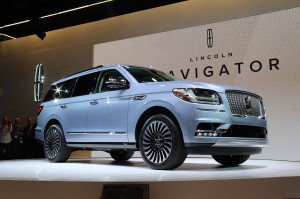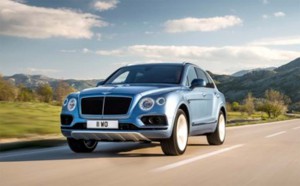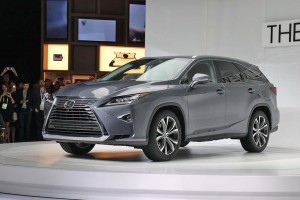Few automakers had a bigger presence at the L.A. Auto Show’s media preview this week than BMW, its stand filled with an array of new production vehicles, concepts and even a battery-electric motorcycle.
The biggest of those products was the Concept X7, a massive sport-utility vehicle making its North American debut. Though a prototype for now, BMW officials made it clear that a production model is already in the works.
BMW isn’t alone. While Lexus used the Los Angeles show to preview a stretched version of its midsize RX utility vehicle, expect a much more lavish, full-size crossover model to follow. Where sedans like the BMW 7-Series long served as brand flagships, large utes are rapidly taking over, even Rolls-Royce developing one for its own line-up.
The trend isn’t difficult to understand. In the U.S. market, utility vehicles now account for about half of overall new vehicle sales, a trend that is expected to continue for a while. Luxury makers were late to the party but have rapidly been catching up as they add more new models.
The Lexus RX is already that brand’s top-selling product, as is Bentley’s big Bentayga. There’s not a single global luxury brand that doesn’t have at least one ute in the line-up, or with one or more in development. That includes not only Rolls but Aston Martin and even Ferrari.
(Lexus RX 350L: Bigger is better for luxury ute. For more, Click Here.)
Many are targeting the premium and ultra-premium segments that have long defined those brands. The production version of the Concept X7 will be more than just “the big brother” of the current BMW X5, explained the maker’s global marketing chief Ian Robertson, during the L.A. show. It will be a true flagship on a par with the BMW 7-Series sedan.
And for good reason, as classic, brand-defining sedans like the 7-Series, the Mercedes-Benz S-Class and Lexus LS, are losing their luster.
High-line brand sales, in general, have slipped this year, in part due to a lack of SUV alternatives. But nowhere is that more apparent than in the premium luxury segment, where demand has been a downward trend since the beginning of the decade. In 2010, those big sedans generated 88,000 sales in the U.S. market, a figure that dipped almost 15%, to 75,000 for all of 2016 – and which continues to fall this year.

The Lincoln Navigator is the most expensive and perhaps most luxurious vehicle in the brand's line-up.
That might not seem like that much until you consider that in 2010 the U.S. automotive market was just coming out of a deep recession and overall vehicle sales were an anemic 11.5 million. In 2016, overall demand hit a record 17.5 million.
(Click Here for more about the redesigned Lincoln Navigator.)
“The floor for sedan sales continue dropping,” said IHS Automotive analyst Stephanie Brinley. As a result, “I can’t think of any brand that won’t be in that (premium luxury) space” with a flagship SUV alternative to the big sedans they’ve traditional offered.
After years of largely ignoring its once wildly popular Escalade model, Cadillac gave it a major makeover in 2013. Lincoln, Caddy’s domestic rival, was all but ready to pull the plug and abandon its big Navigator model before reading the market’s tea leaves. After years of neglect, it gave the full-size model a modest facelift in 2015 and is now launching a complete makeover that is the most lavishly equipped – and most expensive – model in its line-up.
Based on what BMW is showing with the Concept X7, the production model will be at least as well-equipped as the 7-Series, and likely a fair bit more expensive.

Ferrari is following in the footsteps of other high-end brands with a new ute, like the Bentley Bentayga.
For its part, Lexus does already offer the LX, a full-size ute that, like the Cadillac Escalade and Lincoln Navigator, uses a truck-like body-on-frame design. But it is believed to be working up a more modern, car-based alternative to the brand’s current flagship, the LS sedan. It could hit market before the end of the decade.
Even with declining sales, don’t expect such traditional sedans to go away, however, cautioned analyst Brinley. “There’s always the ability to be more expressive with a sedan and have more of an emotional connection,” a key role for a product defined as a “flagship.”
(Bentley debuts first diesel in Bentayga. Click Here for details.)
On the other hand, many buyers clearly develop an emotional connection with the broad capabilities offered by a well-engineered SUV or CUV, and that’s why the segment is expected to grow, whatever the price level.


